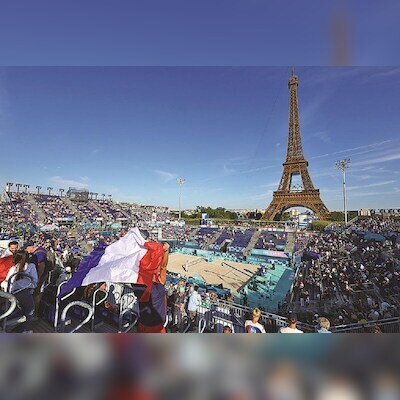[ad_1]
By Vivienne Walt & Sarah Kessler
Like every city that hosts the Olympics, Paris designed its opening ceremony to make a splash, with ethereal dance performances, athletes floating down the Seine and a blowout performance by Celine Dion. A big display is table stakes, and hundreds of thousands of people jammed the city’s bridges and riverbanks for hours to cheer the flotilla. But to make these Olympics truly unique, Paris also had something quieter in mind: It vowed to buck the decades-long trend of spending a dizzying fortune on hosting them.
That vision for a budget-conscious Olympics does not seem to have panned out. The tab for the Games in Paris, the first city to fully test cost-cutting reforms that the International Olympic Committee introduced in 2019, is at least $8.87 billion. That isn’t an eye-popping bill compared with the $17 billion that London spent in 2012, the estimated $28 billion that Tokyo spent in 2021 or the $24 billion that Rio de Janeiro spent in 2016 — the three most expensive Summer Games to date. But the figure is more than $1 billion above the historical median cost of hosting the Games, according to a study by researchers at Oxford’s Said Business School published in May. And it is about 115 percent above Paris’s initial estimate.
“This is not the cheap Games that were promised,” the study concluded.
Figuring out how to keep host city expenses on budget is vital for the Olympics, which have struggled to find host cities in places where citizens have a say in the decision. When the IOC voted on Wednesday to give the 2030 Winter Games to the French Alps and the 2034 Winter Games to Salt Lake City, both cities were the only candidates.
Repurposing buildings hasn’t necessarily solved the Games’ budgeting problem. Paris’s central argument in its bid for hosting rights was that reusing existing sporting facilities would help it avoid the steep capital investment that inflicted lasting economic pain on Olympic cities like Athens and Rio de Janeiro, as well as stave off anti-Olympic sentiment in the city. Los Angeles, host of the 2028 Summer Games, has promised no new Olympic buildings.
But while refurbishing buildings may be more sustainable, adapting old monuments for the Olympics has taken years — at a cost that has not been revealed. Take the 125-year-old Grand Palais, a soaring iron, glass-roofed exhibition hall in central Paris, where fencing and taekwondo competitions will take place. It shut down for renovations in March 2021 and was scheduled to be closed for so long that the city constructed a new Grand Palais near the Eiffel Tower.
Upgrading venues for Olympic event standards, media requirements and security may prove more expensive than constructing temporary buildings, said Alexander Budzier, a fellow in management practice at Said Business School who co-wrote the May study. And not everything can be easily reused. “Which tourists are going to hurtle themselves down a bobsled track at suicidal speeds?” Budzier asked. “These are expensive and difficult to use afterward.”
Every Olympic host since at least 1960 has spent more than planned. Tokyo’s budget for the 2020 Olympics, which were postponed during the pandemic to 2021, rocketed nearly fourfold, and London’s 2012 Olympic spending more than tripled its bid. Sochi, Russia, is believed to have spent a staggering $50 billion hosting the 2014 Winter Games, nearly 400 percent more than its initial $10.3 billion bid (Russian officials argued that much was spent on road building).
Financially untenable
> The tab for the Games in Paris is at least $8.87 billion. But figure is 115% above initial estimate, according to an Oxford’s Said Business School study
> Every Olympic host since at least 1960 has spent more than planned
> The calendar for each Olympic Games is fixed about seven years in advance, no matter the economic conditions at the time
> There is very little transparency about spendings
First Published: Jul 28 2024 | 10:15 PM IS
[ad_2]
Source link

